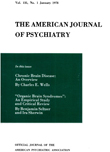AN EVALUATION OF FUNCTIONAL PSYCHOSES IN OLD AGE
Abstract
1. Recent and more refined epidemiologic data indicate that the incidence of functional pychoses in the elderly population is much higher than earlier studies have indicated.
2. Analysis of the epidemiologic data indicates that there is a close relationship between certain social factors and the incidence of mental illness in later life.
3. Evidence presented here and in previous research reports which are cited are interpreted to suggest that "social aging" is at least as significant as physical aging in the occurrence of mental illness in later life.
4. The concept of "forced dependency" is suggested to describe the attempts of society to relegate its independent and autonomous elderly members to a secondary status. "Role obsolescence" is suggested as describing the characteristic fate of the elderly person who has outlived his mode of usefulness to self and others. The reaction to this obsolescent dependent state with its loss of personal identity is suggested as a major source of behavior pathology in the aged individual.
5. The conclusion seems to be warranted that a functional illness characterized by depressed mood is as typical or more typical of mental illness in this age period than is an illness characterized by a chronic brain syndrome. The possibility of a functional form of senility in addition to the more commonly recognized organic pathology might also be considered in investigating the psychiatric disorders of the aged.
Access content
To read the fulltext, please use one of the options below to sign in or purchase access.- Personal login
- Institutional Login
- Sign in via OpenAthens
- Register for access
-
Please login/register if you wish to pair your device and check access availability.
Not a subscriber?
PsychiatryOnline subscription options offer access to the DSM-5 library, books, journals, CME, and patient resources. This all-in-one virtual library provides psychiatrists and mental health professionals with key resources for diagnosis, treatment, research, and professional development.
Need more help? PsychiatryOnline Customer Service may be reached by emailing [email protected] or by calling 800-368-5777 (in the U.S.) or 703-907-7322 (outside the U.S.).



